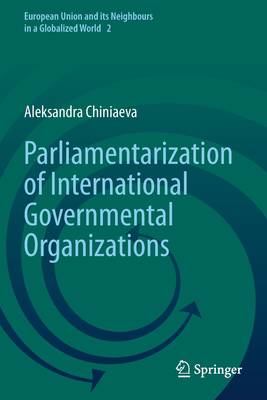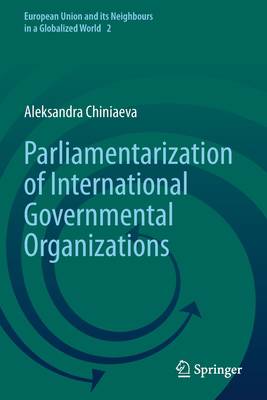
Door een staking bij bpost kan je online bestelling op dit moment iets langer onderweg zijn dan voorzien. Dringend iets nodig? Onze winkels ontvangen jou met open armen!
- Afhalen na 1 uur in een winkel met voorraad
- Gratis thuislevering in België vanaf € 30
- Ruim aanbod met 7 miljoen producten
Door een staking bij bpost kan je online bestelling op dit moment iets langer onderweg zijn dan voorzien. Dringend iets nodig? Onze winkels ontvangen jou met open armen!
- Afhalen na 1 uur in een winkel met voorraad
- Gratis thuislevering in België vanaf € 30
- Ruim aanbod met 7 miljoen producten
Zoeken
Parliamentarization of International Governmental Organizations
Aleksandra Chiniaeva
€ 137,45
+ 274 punten
Uitvoering
Omschrijving
This book offers a general framework for a better understanding of the differences and similarities between the institutional rules of intergovernmental organizations that include parliamentary elements, and analyzes the role of various types of international parliamentary assemblies in the system of global governance, as well as insights into the process known as "parliamentarization of international organizations."
Firstly, it presents a case study of various types of international parliamentary assemblies, which is then used to analyze the law of particular international organizations that include parliamentary assemblies or relate to them. Secondly, the book compares two parliamentary assemblies of international organizations - the Parliamentary Assembly of the Organization for Security and Co-operation in Europe (OSCE PA) and the Parliamentary Assembly of the Council of Europe (PACE) - in terms of structure, powers, and relations with their IGOs. It also investigates the activities of assemblies and their cooperations for the purpose to explore the positive effects of the work of international parliamentary assemblies and their potential for having an impact at the national level. Lastly, the book analyzes the tangible and desirable powers of international assemblies by comparing examples of existing international parliamentary assemblies with the UN Parliamentary Assembly project. Based on that, the author compiles a list of essential requirements and principles for effective international parliamentary assemblies.Specificaties
Betrokkenen
- Auteur(s):
- Uitgeverij:
Inhoud
- Aantal bladzijden:
- 221
- Taal:
- Engels
- Reeks:
- Reeksnummer:
- nr. 2
Eigenschappen
- Productcode (EAN):
- 9783030713430
- Verschijningsdatum:
- 23/04/2022
- Uitvoering:
- Paperback
- Formaat:
- Trade paperback (VS)
- Afmetingen:
- 156 mm x 234 mm
- Gewicht:
- 335 g

Alleen bij Standaard Boekhandel
+ 274 punten op je klantenkaart van Standaard Boekhandel
Beoordelingen
We publiceren alleen reviews die voldoen aan de voorwaarden voor reviews. Bekijk onze voorwaarden voor reviews.











